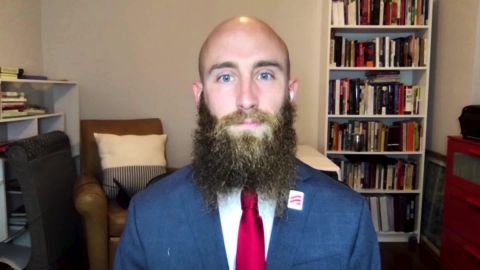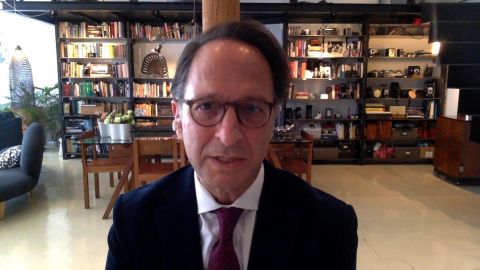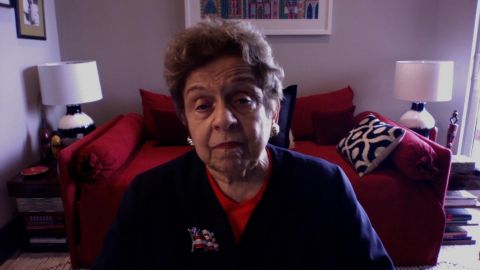Read Transcript EXPAND
CHRISTIANE AMANPOUR: Now, before President Trump fell ill, the biggest news on the campaign trail was his refusal to denounce white supremacy and far-right groups such as the Proud Boys, at the first presidential debate. You recall that. Well, our next guest is a U.S. Army vet who spent years tracking how hard these groups actually work to recruit American soldiers. Kristofer Goldsmith joined the Army after 9/11. And he’s the founder of High Ground Veterans Advocacy. And here he his telling our Hari Sreenivasan about the dangers white supremacist hate groups pose to democracy.
(BEGIN VIDEOTAPE)
HARI SREENIVASAN: Christiane, thanks. Kris, thanks for joining us. When the president on the debate stage was asked to disavow white supremacy, and he only said, “Stand back, stand by,” why was that so significant?
KRISTOFER GOLDSMITH, FOUNDER, HIGH GROUND VETERANS ADVOCACY: When the president used the phrase, “Stand by, stand by,” what that sounded like to me, as a veteran, and what it probably sound like to — well, it did sound like to the Proud Boys, were orders to get ready to mobilize. And I think that that’s the president’s intentions were. He’s not said that the Proud Boys should disband. He has not said that they should disavow their support for him. He seems to be ready to call these people to action. Whether that’s for voter suppression and voter intimidation tactics, which I imagine we will likely see from them, or if he will straight up call for acts of violence, I think nothing is off the table for this president when it comes to retaining power.
SREENIVASAN: His contention is, the far right and groups like these are not the problem, that, from his perspective and the perspective of several people who support him, several million people who support him, that it’s Antifa and the far left that we need to be worried about.
GOLDSMITH: One of the things that I think we need to start doing is, is stop saying Antifa, because that is an abstract term that FOX News and the president have really weaponized. Anti-fascist should be the American position. I mean, we went to war against two of them during World War II. Right now, the Proud Boys, who President Trump lies and says he doesn’t know what they are, they’re like Mussolini’s Blackshirts and Hitler’s Brownshirts. They are thugs who want to help support an authoritarian regime. Now, thankfully, our democracy is still working. Our — despite the president’s disinformation about mail-in voting, our voting system is safe, according to the national — the intelligence communities and law enforcement communities. And we do have an opportunity to speak loudly that we are all anti-fascist.
SREENIVASAN: Why do you think that active-duty members of the military and veterans and law enforcement are being targeted by these white supremacy groups?
GOLDSMITH: White supremacy groups and foreign disinformation campaigns target service members, veterans and people in our community because we’re seen as community leaders. Graphika, an organization that the Senate Intelligence Committee has relied on to review disinformation campaigns, found that service members and veterans are looked at as community leaders. Service members and veterans are more likely to vote. They’re more likely to have leadership positions within the community, whether that’s helping run a Scouts troop, or being firefighters or running for office. Because we are influencers in the pre-social media sense, we’re an economically efficient target for these folks. And if a white supremacist can convince a veteran of their racist, xenophobic ideology, that veteran might bring his group of friends along with him, might bring his family along with them. And, sadly, in my research, that’s what I have seen. The radicalization of individual service members and veterans has had a negative influence on their immediate community, their family, their social circles.
SREENIVASAN: How much of this philosophy is permeating law enforcement and active military, active law enforcement and active military today?
GOLDSMITH: “Military Times” recently did a poll. And they have done this poll several years in a row. And their findings have been disturbing. And that’s the biggest threat, according to current service members, is white supremacy in the United States. Current service members see this for what it is. And that’s because there are bases in places where white supremacy is thriving. I was stationed at Fort Stewart, Georgia. I had never seen a Confederate Flag or a Nazi flag in real life until I was stationed in Georgia. And that’s not to say that everyone in Georgia is a racist, but those people have a stronghold down there. And it is something that is growing. The Proud Boys that we know of thanks to President Trump promoting them, they’re strong here in the New York metro area, where I live.
SREENIVASAN: Without giving away too much of the methods in how you know this, you have been able to see the internal discussions of some of these groups. What do they talk about? What’s the chatter like?
GOLDSMITH: So, one of the things that these white supremacist organizations talk about on their private chats, which have thankfully been leaked by anti-fascist organizers, is things like the Jewish question, which is a euphemism for Nazis and Hitler ideology, where they believe that Jewish people are controlling everything that happens in the world. I think that Trump, his — one of his biggest mistakes is thinking that the fascists are on his side. The real fascists are not on President Trump’s side. They look at the proximity of someone like Jared Kushner and his daughter Ivanka, who converted to Judaism, and they see President Trump as a Jewish tool, which is offensive to even talk about. I hate to even talk about these ideologies. But President Trump needs to get through his mind that his family is going to be threatened by these people that he thinks are his supporters.
SREENIVASAN: What do you do if someone in your circle, a family member is starting to be, I guess, a little more convinced by these groups? Because it’s hard already in America in 2020 to have conversations with people that you have political disagreements with, but when you see this somewhat virulent strain of ideology come in, what can you do?
GOLDSMITH: You know, one of the most terrible things about this pandemic is that it’s taken away a lot of face-to-face discussions. And these discussions about racism and extremist ideologies are extremely difficult to have on Facebook, on Twitter, and on some of the lesser known social media platforms like Telegram and Gab that the white supremacists have basically co-opted. You know, these people, if you can’t talk to them face to face, it’s really not even worth trying to convert them. What needs to be done is, if you know someone who’s expressing racist ideology, let other people know that this person is a racist. You know, this person — if a firefighter is a racist, if a cop is a racist, they’re — they have the ability to either save or take a life, depending on their actions.
SREENIVASAN: The FBI recently sent out a bulletin to law enforcement agencies, and it said, “Domestic violent extremists across the ideological spectrum likely will continue to plot against government and election- related targets to express their diverse grievances involving government policies and actions.” What are you concerned about heading into November?
GOLDSMITH: I’m concerned about President Trump inciting violence. I think that, no matter what happens, we’re not going to know who won the election the day after Election Day. It’s going to take time to count all the votes. And, in the meantime, President Trump has already primed his followers to believe that the election is going to be stolen from him. And these groups who have been organizing out in the open, these fascist organizations like Proud Boys, are ready and willing to commit violence. And, as we know, they feel like they took orders the other night. If he tells them to hit the streets, they’re going to and they’re going to be armed. And they’re going to be willing to commit violence against innocent Americans.
SREENIVASAN: I want to get a little bit into your story. You’re a veteran. You have gone through severe PTSD, contemplated and tried to take your own life. First, I want to ask you about something else that happened in the press recently, which was — the reports first came through “The Atlantic” and Jeffrey Goldberg, and since has been corroborated by lots of other outlets. And it was that the president had said some pretty disparaging things about the veterans laying in Normandy and in Arlington. What went through your mind when you heard that?
GOLDSMITH: I wasn’t surprised to hear those comments. I mean, we know that the president disparages his own supporters, whether they be police officers, or military service members and veterans, or religious groups that support him. None of this is a surprise. And we know that not just from his words, but from his whole history and life. Never has the president, has President Donald Trump put the nation before himself, not in office and not before office. Any time that he’s ever said that he was donating money to veterans, like he did during the 2016 campaign, he didn’t do it until David Fahrenthold of “The Washington Post,” you know, found that there were no receipts, that he never did donate to veterans. It is sad that veterans are used as props by this president. And it is infuriating. I mean, I come from a family where my grandfather’s generation, almost every one of them served in World War II. They were anti-fascists serving overseas to make sure that people across the world didn’t have to face fascist regimes. And to know that President Donald Trump set foot on those hallowed grounds and told General John Kelly, what was in it for your son, why did he do this, just shows how much disrespect and disregard President Trump has for troops and vets.
SREENIVASAN: I also wonder about — and you’re kind of in a much more unique position to be able to answer this, but the type of anguish that so many veterans are living with right now. What goes through someone’s mind and what is seeing and hearing that the commander in chief of the forces that you fought for and with says something like that? What does that do to your psyche?
GOLDSMITH: I struggled with PTSD from the time that I was in Iraq in 2005 and since. And for large portions of my life, post-traumatic stress disorder defined every minute of every day. I went through years where I couldn’t sleep without drinking alcohol. That’s something that may never go away. It’s something that, thankfully, because I have access to the Department of Veterans Affairs hospitals, and I get great treatment there — PTSD is something that never really goes away. When you’re deployed to a combat zone in your late teens or early 20s, your brain is still developing. The human body is not set. The biochemistry is still working its way through. And when you become hard-wired for that kind of stress of any day thinking that you could be killed, of seeing your friends get hurt, seeing your fellow Americans get killed, it makes it so that, every time that I hear “Taps,” the bugle, the song that they play at funerals, I mean, I feel a well of emotions that is difficult to describe. I think that everyone who’s ever heard that, especially those who have experienced a ceremony like that overseas, like I did, you get the chills. And to have that emotion, and to know that the president of the United States is incapable of feeling that, is something that I am deeply offended by. You know, the debate the other night, when Joe Biden brought up his son Beau, who served in Iraq, like I did, and then President Trump tried to interject by using Hunter Biden, who has struggled with addiction, as a way to denigrate the Biden family, that is something that kills me inside. I’m someone who struggled with addiction. I’m a veteran. I lost my cousin, I lost a couple guys from my unit from the same kind of brain cancer that Beau Biden had. And to hear the callousness live on TV, unfiltered, as President Trump tried to use addiction against the Biden family to make it so that Vice President Biden couldn’t even talk about his son Beau is infuriating to me. And I know it is to so many other veterans, regardless of their political affiliation.
SREENIVASAN: So, Kris, why is there still such strong support for the president way inside the armed forces, inside law enforcement? I mean, because, in a way, he’s able to frame it as, you’re either with me, the law and order president, or you’re against me, you’re with the defund the police camp.
GOLDSMITH: I have to correct you on that. That’s actually a disinformation point that the Republican Party…
SREENIVASAN: OK.
GOLDSMITH: … wants you to believe. A recent poll by “Military Times” showed that Joe Biden right now has a plurality of support in this upcoming election from active-duty service members. The Republican Party has done a fantastic job of convincing Americans that they are the ones who support police, that they are the ones who support veterans. But, in fact, I mean, if you just take an academic view, and you say, all right, well, who’s been better for the budget when it comes to taking care of military families of veterans, of ensuring that police are afforded the equipment and intelligence necessary to combat the 21st century threats that they have been dealing with, well, it’s the Democratic Party. I wish that Democrats would do a better job of this, but the good thing is, is that service members know what’s going on right now. Service members recognize that racists and fascists are the greatest threat to the United States.
SREENIVASAN: Kristofer Goldsmith, thanks so much for joining us.
GOLDSMITH: Thanks for having me.
About This Episode EXPAND
Rep. Donna Shalala (D-FL) and global health expert Devi Sridhar give a reality check on COVID and presidential politics. Andrew Weissman gives new insight into the Mueller investigation. U.S. army veteran Kristofer Goldsmith explains how white supremacists are targeting veterans for recruitment.
LEARN MORE



